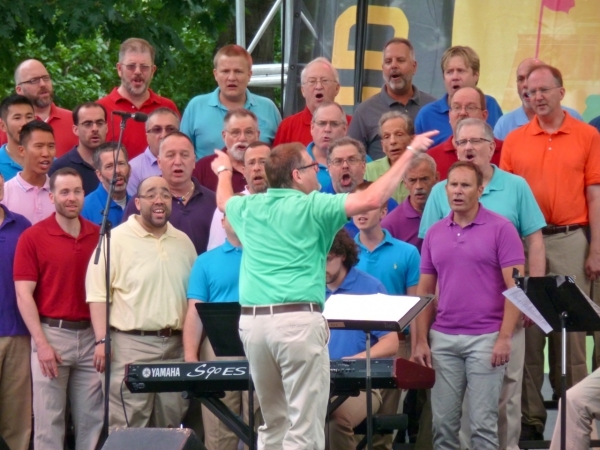BRATTLEBORO — A summer sun shone through the fan-shaped stained glass windows of the Brattleboro Retreat chapel. Across from the stage area used for plays and gatherings in the hospital's mid-century years, men's voices rose in song.
The voices, piped through thoroughly modern speakers, belonged to members of the Boston Gay Men's Chorus.
In a rare excursion beyond their performance area of Massachusetts, the 175-member chorus, led by Musical Director Ruben M. Reynolds III, will perform at the Latchis Theatre in November.
Proceeds from the full-length concert will benefit the Retreat's lesbian, gay, bisexual and transgender (LGBT) program, and training and outreach activities.
According to a press release, the “Retreat's LGBT program has created a safe and affirming atmosphere free from prejudice, where LGBT people and allies can come to address any mental health or addiction challenges. The program staff have specialized education and experience related to gender and identity to help create a culturally sensitive and informed environment of care.”
Rob Simpson, the Retreat's president and CEO, said that “identifying as LGBT does not make an individual more predisposed to mental illness or addiction, but stigma, social prejudice, and discrimination can accompany LGBT identification and create heightened risk of mental health and well-being.”
The Boston Gay Men's Chorus sings songs from across the spectrum of classical and popular music. Under the fun and musicianship runs a goal to foster social change by providing a positive, affirming image of the gay and lesbian community.
The chorus routinely stages fundraisers in partnership with Massachusetts high school gay-straight alliance groups.
Bette Abrams, chair of the Retreat's board of trustees, spent two years working to persuade the chorus to travel north. According to Simpson, mobilizing a chorus of more than 100 requires lots of planning.
Once members of the Retreat explained what excited them about their LGBT program, the chorus took an interest.
The Retreat's inpatient LGBT program has served more than 1,000 people since its founding in 2009.
The program offers care for mental health issues such as acute depression and other mood disorders, substance abuse, anxiety, grief, and loss issues; sexual and gender identity issues, trauma, self-harming, and co-occurring disorders - when two or more disorders are present.
According to Eileen Glover, the Retreat's LGBT program representative, the program's clinicians consider the whole patient and strive to help each person reach their treatment goals.
“We strive to create a space free from stress or anxiety around gender and sexual orientation,” said Glover.
She added that it's hard for people to expand when they're carrying tightly wound secrets.
“From making sure we are using the pronoun a person prefers to having advanced medical understanding of people transitioning genders, we work very hard to be as sensitive and knowledgeable to their circumstances as possible.”
Glover continued: “This allows people struggling to address their mental health or addiction challenges without the barriers they faced in the past.”
Glover said she has felt surprised at the program's ability to create a microcosm of an ideal community that fosters mentorships, busts stereotypes, and honors diversity.
Another aspect of the program is helping people rediscover their self awareness and individual voice, said Glover: “Music supports self-expression.”
Glover said she remembers the day music helped a patient reconnect with those around her: “The first time we heard her speak, she was singing.”
According to Glover, due to a trauma, the woman had not spoken for the first four or five days in the program. Her first few days on the unit coincided with the hospital's version of “Retreat Idol” - based on the televised music competition “American Idol.”
She sat in the audience, but didn't participate, Glover explained. Then - one day - she started to sing. Glover reports the woman's voice had a bluesy, jazzy, Billie Holiday quality. Everyone on the unit stopped to listen.
Gradually this patient began engaging and interacting with others. Music had helped her reach a place where she felt safe enough to engage in treatment.
The Boston Gay Men's Chorus performs at the Latchis Theatre on Saturday, Nov. 1, at 7:30 p.m. The Retreat also will honor the recipient of the Anna Marsh Award for advocacy on behalf of people with mental illness and addiction.
Money raised from the BGMC's November performance also will fund outreach and education activities. Glover said she hopes the Retreat's LGBT program can support the next generation of clinicians and educators.
The chorus' mission is to inspire change, build community, and celebrate differences.
In a brief documentary, “Standing Together,” chorus members speak of community, unconditional love, and celebrating differences in describing what chorus participation means to them.
Member Stephen Connor joined the chorus in 2011. He said he and his wife attended performances for years before Connor came out at 60.
Samuel Brinton also joined the chorus three years ago. He arrived in Boston as a college student to study nuclear engineering at MIT and law at Harvard. Brinton, who grew up at a mission organization he declined to name, came out to his family at about age 10.
His parents welcomed the news by sending Brinton to harsh “conversion therapy.”
While in “therapy,” Brinton said, he suffered treatments similar to those practiced by psychiatric hospitals 100 years ago. Such treatments inspired Retreat's founder, Anna Marsh, to found a hospital based on a practice called moral treatment after a family friend died as a result of “the bath of surprise,” in which patients were plunged into frigid water in an attempt to “shock the insanity out.”
For Brinton, he said conversion therapy involved having his hands held in ice water, having his hands burned, and suffering electric shock.
Of the first BGMC performance he attended, he was greeted by a new community: “I walked in and was met by a family.”
